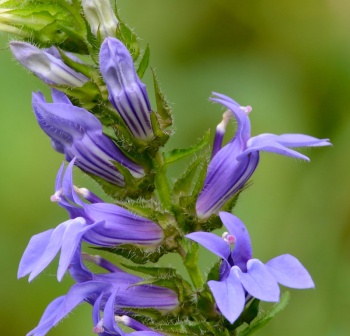Indian Tobacco
From Wikiwel
See also : Ban Bian Lian
Other Names : Lobelia inflata, Lobelia, pukeweed, Indian tobacco, gagroot, asthma weed, vomitwort, bladderpod, rapuntium inflatum, Bladderpod, Emetic Herb, Gagroot, Herbe à Asthme, Lobélie, Lobélie Brûlante, Lobélie Enflée, Lobélie Gonflée, Tabac Indien, Vomit Wort, Wild Tobacco.
Lobelia is found in drier areas of America and Canada. The above ground parts are used to make medicine.
Special Precautions and Side Effects of Lobelia
- In excessive doses the effects are those of apowerful acro-narcotic poison, producing great depression, nausea, cold-sweats, and possibly death. (Herbalists also deny that it has poisonous properties and that it has ever caused death.) Poisonous symptoms may occur from absorption of it through the epidermis.
- It is vital to note that this herb can have risks that outweigh its benefits and has been known to cause vomiting, dizziness, hypothermia, convulsions and even death.
- Lobelia is considered UNSAFE for most people when taken by mouth. Side effects include nausea, vomiting, diarrhea, cough, dizziness, tremors, and more serious effects.
- Overdose may cause many serious toxic effects including sweating, convulsions, fast heartbeat, very low blood pressure, collapse, coma, and possibly death. Taking 0.6-1 gram of the leaf is said to be toxic, and 4 grams may be fatal.
- Not enough is known about the safety of applying lobelia to the skin.
- Pregnancy and breast-feeding: It’s UNSAFE for anyone to take lobelia by mouth. The particular concern during pregnancy is that it can cause serious vomiting. Don’t take lobelia if you are pregnant or breast-feeding.
- Stomach or intestinal problems including ulcers, Crohn's disease, inflammatory bowel disease, infections, and others: Lobelia can irritate the GI tract.
- Heart disease: Lobelia seems to affect the heart. Larger doses cause more of an effect.
- Lithium interacts with LOBELIA
The benefits of Lobelia are
Expectorant, diaphoretic, anti-asthmatic. It should not be employed as an emetic. Herbalists, who use lobelia far more than the ordinary practitioners, nearly always prescribe it in doses large enough to prove emetic, and regard it as of greater value thus used (See Precautions and Side Effects).
- Respiratory Diseases and Lung Health : Lobelia contains an alkaloid known as lobeline, which thins mucus, breaks up congestion. Additionally, lobelia stimulates the adrenal glands to release epinephrine, in effect, this relaxes the airways and allows for easier breathing. Also, because lobelia helps to relax smooth muscles, it is included in many cough and cold remedies. Lobelia should be part of everyone’s respiratory support protocol! Lobelia inflata is a bronchodilator and antispasmodic which explains its popularity as a medicinal herb for asthma, spasmodic croup and pneumonia. At a non toxic dose, lobelia is thought to be of value as an herbal remedy for treating bronchitis and whooping cough. Did you know that horses given lobelia are able to breathe more deeply? Its benefits are not limited to equestrians. It has been used as “asthmador” in Appalachian folk medicine. Lobelia, by some accounts, is thought to be one of the most valuable herbal remedies in existence.
- Quite Smoking : Lobelia is often considered an herb that is useful for tobacco withdrawal and as an herbal remedy to quit smoking. While there is no information that consolidates this view, historically, lobelia has been used as an alternative to tobacco. Lobeline is also believed to have a similar chemical action to nicotine and this too could give reasoning behind its use in tobacco withdrawal.
- Cancer : Extracts of Lobelia inflata contain lobeline, which showed positive effects in the treatment of multidrug-resistant tumor cells.
- Lobelia inflata was used in the 19th century as a medicinal herb to induce vomiting as a mean to remove harmful toxins from the body, which explains one of its name "puke weed."
- Hypotensive : Lowering Blood Pressure
- Externally, an infusion has been found useful in ophthalmia, and the tincture can be used as a local application for sprains, bruises, or skin diseases, alone, or in powder combined with an equal part of slippery elm bark and weak lye-water in a poultice. The oil of Lobelia is valuable in tetanus. One drop of oil triturated with one scruple of sugar, and divided into from 6 to 12 doses, is useful as an expectorant, nauseant, sedative, and diaphoretic, when given every one or two hours.
